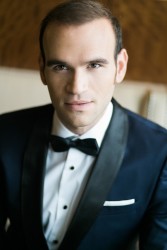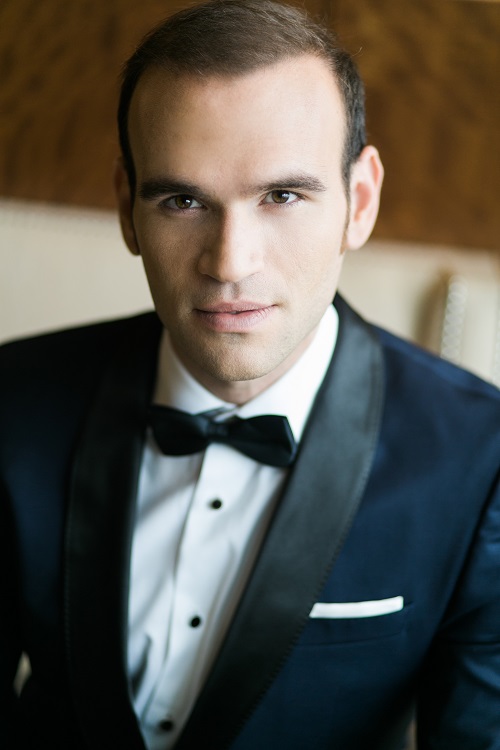 United Kingdom Duparc, Liszt, Puccini, Toscanini, Barber: Michael Fabiano (tenor), Julius Drake (piano), Wigmore Hall, London 21.4.2017. (RB)
United Kingdom Duparc, Liszt, Puccini, Toscanini, Barber: Michael Fabiano (tenor), Julius Drake (piano), Wigmore Hall, London 21.4.2017. (RB)

Duparc – ‘Le manoir de Rosemonde’, ‘Lamento’, ‘La vie antérieure’, ‘Chanson triste’, ‘Extase’, ‘Élégie’, ‘Phidylé’
Liszt – ‘Oh! quand je dors’, ‘S’il est un charmant gazon’, ‘Comment, disaient-ils’, ‘Enfant, si j’étais roi’
Puccini – ‘Inno a Diana’, ‘E l’uccellino’, ‘Terra e mare’, ‘Mentìa l’avviso’
Toscanini – ‘Spes, ultima dea’, ‘Il pescatore’, ‘Donna, vorrei morir’
Barber – Three Songs Op.10
Michael Fabiano has garnered some rave reviews for his operatic performances in recent years. Last month he gave a stunning performance as Alfredo in La Traviata at the Metropolitan Opera in New York. He was joined by Julius Drake for this debut recital at the Wigmore Hall.
The duo opened with a selection of songs by Henri Duparc which were composed in the 1870’s and 1880’s. Fabiano and Drake are both exceptional artists and there was much to admire in these performances. However, the shimmering sensuality and Gallic refinement were not quite there in some of the songs and this for me was the least successful part of the recital. In ‘Le Manoir de Rosemonde’ Drake conjured up the frenetic movement of the horse while Fabiano produced a powerful sound which conveyed the alarm in the poem. However, Fabiano’s voice was a little overpowering and the sense of eerie disquiet was missing from the final two stanzas of the poem. There was a pleasing sense of intimacy in ‘Lamento’ and I liked the emotional directness which Fabiano brought to the song. There were some gorgeous colour changes in ‘La vie antérieure’ and Fabiano gave a technically assured performance. However, the vocal line was a little too hard edged and I would have liked a greater range of dynamics and to have heard more of the shimmering sensuality in the poem – for example the description of the “naked slaves all drenched in perfume”. Fabiano brought enormous sensitivity and lyricism to ‘Chanson Triste’ and there was some gorgeous word painting against Drake’s rippling accompaniment. The performers did an excellent job conveying the pastoral tone painting in ‘Phidylé’ although it could have done with a more seductive caressing of the vocal line.
The first half concluded with a selection of French songs by Franz Liszt written in the 1840’s. Fabiano brought an effortless lyricism to ‘Oh! quand je dors’ and the song blossomed beautifully although I would have liked to hear a greater sense of rapture at the climax points in the song. Fabiano brought enormous charm to ‘S’il est un charmant gazon’ which was beautifully enhanced by Drake’s rustling semiquaver accompaniment. ‘Enfant, si j’étais roi’ was powerful and dramatic: Fabiano’s magnificent voice soared through the hall while Drake showed his virtuoso credentials with some Lisztian fireworks. This was a real show stopper and a great way to end the first half of the recital.
Fabiano and Drake moved from strength to strength in the second half of the recital with some outstanding performances of songs by Puccini and Toscanini. The Puccini songs were written while the composer was working on Tosca and Madama Butterfly. Fabiano gave a bravura performance of ‘Inno a Diana’ which he delivered with ringing splendour, eliciting spontaneous applause from the Wigmore audience. He brought lightness and wit to E l’uccellino while Drake characterised the eponymous little bird in a delightful way. Fabiano captured the heady Romanticism of ‘Terra e mare’ perfectly while ‘Mentia l’avviso’ was full of burning passion and featured some blazing top notes from Fabiano. I was not familiar with the Toscanini songs prior to the recital but they were better than I was expecting. The great Italian conductor resolved to abandon composition at the age of 21 while listening to the second Act of Wagner’s Tristan and Isolde (the wonderful love duets in that Act set the bar very high and no doubt deterred other aspiring composers). Fabiano and Drake gave sterling performances and certainly made a strong case for the songs being heard more widely.
The recital ended with three of the songs from Samuel Barber’s Op.10 collection which sets texts from James Joyce’s Chamber Music. In ‘Rain has fallen’ Drake’s evocation of the splashing rain in the opening section was particularly beautiful while Fabiano captured the brooding inward intensity of the poem to perfection. ‘I hear an army’ had weight and depth of sound and both performers brought home the unrelenting momentum of the song before Fabiano’s great cry of despair in the final stanza.
This was a great way for Fabiano to end his debut recital at the Wigmore Hall and it was greeting with rapturous applause from the audience. Fabiano and Drake performed three encores: they started with an absolutely gorgeous performance of Lensky’s aria from Eugene Onegin before ending the recital in style with glittering performances of arias by Strauss and Tosti.
Robert Beattie
